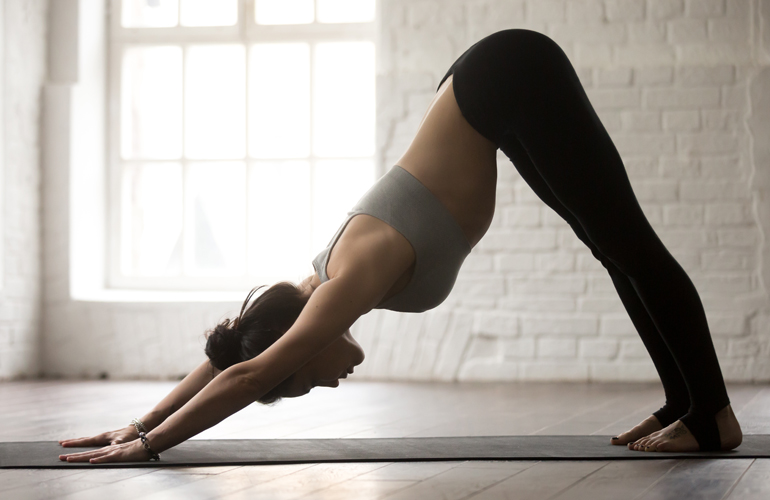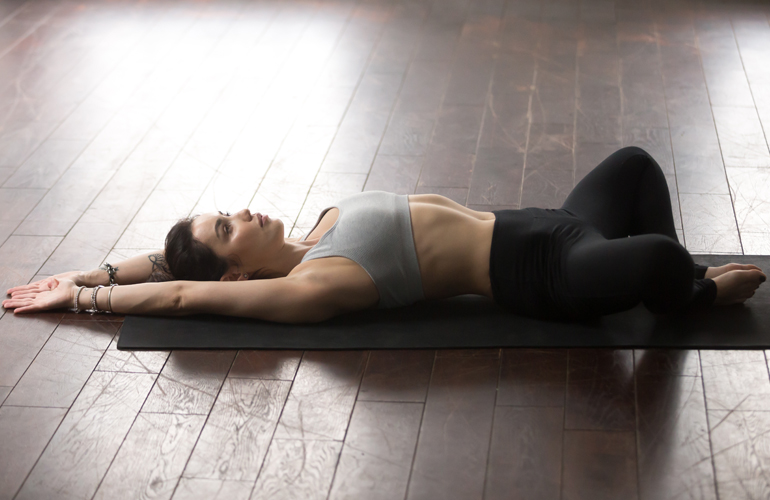In the final part of her series, Sienna Saint-Cyr looks at yoga for mood swings. Learn how to calm the shift in your mood through this set of yoga poses.
As I ventured into the final part of this yoga series looking at yoga for mood swings, I began to see something pop up again and again: our moods are vital to us living a happy life. Psych Central, the Journal of Depression and Anxiety, Psychologist World and many more sources agree that happy people live healthier lives and make better decisions.
Through that, happy folks bring more positive experiences into their lives. The sources also agree that our mood directly affects our happiness. Indeed, it takes mere seconds for even the most fortunate people I know to go from beaming with joy to being sour-faced and irritated. It's in this moment that we need to build resilience.
Rapid changes in mood are due to the vast amount of stimuli that can affect us. We might get cut off in traffic, receive a bad review at work, hear a song, or even get a whiff of a random smell that can trigger a mood shift. Even when I'm happy overall in life, I can lose the feeling for days at a time if I don’t address my current mood of anger, sadness, fear or anxiety.
When my current mood takes centre stage, all my focus shifts there. If the mood is a slight shift, I don’t tend to notice, and both the emotion and my overall happiness can coexist within me. But the moment my emotion moves to a place of being the focus, then it tends to hide my happiness from me.
Mood swings and yoga
Since yoga was doing so well for me in other areas, I began looking at Adriene’s videos on mood. I’d already used hers for compassion yoga and gratitude yoga, so this was a natural place to search. To my surprise, she had several options to choose from.
I decided to try yoga for mood swings. This one called to me most because in the description Adrienne mentioned life’s little annoyances and how they can shift our mood fast. She also mentioned the stress hormones such as Cortisol and how yoga can help with these.
According to the American Psychology Association, this hormone is natural to the body and helps regulate certain systems, but when there's too much of it flowing, it can cause adverse effects. So, when there's too much Cortisol in the system, it’s time to give it the boot!
Yoga for mood swings from Adriene
The practice: yoga for mood swings
In her yoga for mood swings video, Adriene begins with a suggestion to let go and not worry about ‘doing it right’ for this practice. Her focus is more on the body’s needs, so she suggests allowing whatever is going on to exist. To do this, she keeps the practitioner in Sukhāsana (Easy pose) for longer than I found in other videos. In this cross-legged sitting position there's a heavy focus on breath and listening to the body rather than movement.
As she brings the hands into play, Adriene gives the option to have soft hands or active hands. This was helpful because when we’re angry, we may want more pressure and use of our muscles. Personally, I found that I was able to release anger more efficiently when I maintained active muscles.
On the contrary, when I'm sad or depressed, keeping my muscles soft assisted in releasing those emotions more effectively. The heavy focus on listening to our body in this video made a significant difference in the way I worked through my current mood.
Another aspect of this practice that I felt helped me was the release portion. Rather than suggest the practitioners release slowly, she suggested doing what felt right at that moment. It might be jerky and fast, slow and steady, or whatever we need to release our emotion. When I was angry, the quicker and firmer movements helped. When I was sad, the slower releases from poses was most effective.
“In her yoga for mood swings video, Adriene begins with a suggestion to let go and not worry about 'doing it right' for this practice. Her focus is more on the body's needs.”
We then moved into Downward Dog, then into Walk the Dog. The walking kept my legs active. I was again surprised to notice that even when I did the practice during a sad moment, by the time we’d reached this spot in the video, the walking and active legs part was helping. Even though prior, the softer muscles worked best. I took this as a sign that the releasing was working and I made a conscious note of it. Had I started with Walk the Dog, it would have added to my sad mood rather than help it.

Yoga for mood swings: downward dog pose
After Walk the Dog we went back to a seated position and stayed there through the rest of the video, placing much focus on stretching. This was to bring us back into our 'flow', as Adriene calls it. The flow we have when the little things don’t happen to shift our mood.
Adriene maintains positive affirmations throughout the yoga for mood swings video, things like, “I am supported”, which I found incredibly helpful in combination with the poses. She ended with the Reclining Goddess pose, also known as Supta Baddha Konasana. The moment I was in this pose, I felt relief from the emotions that had affected my mood so much. I don’t know why it worked, but it just did.
Perhaps because spreading my legs open in such a manner forces my heart upward at the same time as it puts me in a vulnerable position at my base. As a victim of sexual abuse, opening my legs can be a struggle, even when I’m alone. The more I trust myself and the situation, the easier it becomes to open them.
RELATED: Healing trauma with yoga
But no matter how safe I feel, that position still makes me feel very vulnerable. But when I’m able to feel vulnerable rather than shut it down, it means that I’m working through whatever is causing me emotional pain.

Yoga for mood swings: Reclining Goddess pose
Shifting mood and thought
I wholeheartedly believe that proper yoga for mood swings can change our attitude. If I was doing the wrong kind, like a bunch of super soft poses while I was full of rage, I don’t think that would be helpful. But with Adriene's method of listening to our body’s needs, we can embrace what our instincts tell us and work through the emotions that are sucking the happiness from us.
We will always be affected by our surroundings. We live in a chaotic world the majority of the time. Having the tools to stop, breathe, listen to our body, then move in a manner that releases, could change how we go about our day.
Imagine if I was in line at the grocery store and someone cut in front of me knowing I was there first. No matter what I chose to do at that moment, I’d still have emotions around what happened. I might get angry and say something. I might decide to suck it up and not start an argument. But either way, I’m going to feel slighted. If I don’t deal with the emotion at that moment, it would add to the list other things that happened that day until I became overwhelmed and full of rage.
“Having the tools to stop, breathe, listen to our body, then move in a manner that releases, could change how we go about our day.”
But what if I recognized my anger and what the person did, tuning into my body right there in the line? I could focus on my tense muscles. Listen to my body and what it needed. Then I could stretch or move onto my toes to activate my calf muscles. Many things could be done to release the feeling right there. And this means I don’t need to carry what happened beyond the store.
By shifting my thoughts on how to respond to others, I can also change my mood. If we all began behaving in this manner, the chaos that so many of us know would eventually cease to exist.
Yoga for happiness: series conclusions
If you haven’t checked them out yet, please read part one: Compassion Yoga and part two: Gratitude Yoga as well as this one on yoga for mood swings. This series is designed to give us tools that will assist with the pursuit and ability to maintain happiness and introduce mindfulness, also for those who have difficulties with meditation. From my experiences, Adriene’s yoga series worked for achieving a greater level of happiness. But I had to commit to it completely.
This experience taught me that balancing the mind, body and soul becomes easier when incorporating the practices of yoga and mindfulness. I now pay attention to my thoughts, my body and the tension in it, and my gut, which will conflict with my thoughts more often than I care to admit. These parts of me make up the whole me and keeping them in balance is vital to me being present, complete, and happy. Namaste! ●
Images: colourbox.com
happiness.com | The fine art of being: learn, practise, share
Are you a happiness.com member yet? Sign up for free now to:
■ enjoy our happiness magazine with practical life tips
■ share and support in our happiness forum
■ self-develop with free online classes in our Academy
Written by Sienna Saint-Cyr
 Sienna Saint-Cyr is an author, advocate, and the founder of SinCyr Publishing. She speaks at conventions, workshops, and for private gatherings on the importance of having a healthy body image, understanding enthusiastic consent, using sexuality to promote healing, navigating diverse or non-traditional relationships, having Complex PTSD, and more. Sienna loves sharing her journey of healing and finding happiness with her readers. Along with writing erotica and romance, Sienna speaks at conventions, workshops, and for private gatherings on such sex-positive topics as a healthy body image, using sexuality to promote healing, and navigating diverse or non-traditional relationships. She writes for several websites. Find out more.
Sienna Saint-Cyr is an author, advocate, and the founder of SinCyr Publishing. She speaks at conventions, workshops, and for private gatherings on the importance of having a healthy body image, understanding enthusiastic consent, using sexuality to promote healing, navigating diverse or non-traditional relationships, having Complex PTSD, and more. Sienna loves sharing her journey of healing and finding happiness with her readers. Along with writing erotica and romance, Sienna speaks at conventions, workshops, and for private gatherings on such sex-positive topics as a healthy body image, using sexuality to promote healing, and navigating diverse or non-traditional relationships. She writes for several websites. Find out more.




Join the conversation
You are posting as a guest. If you have an account, sign in now to post with your account.